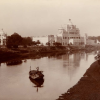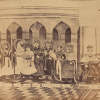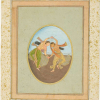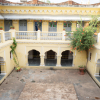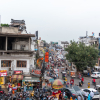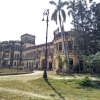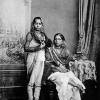Jagtar Singh Grewal is a prominent historian of medieval and modern Indian history, especially the history of the Punjab and Sikhs. He has published over three scores of books—monographs, collections of articles, Persian sources and other edited works—and over a hundred research papers in the past 55 years. His publications relate to the history of historical writing, Indian history, both medieval and modern, history of the Punjab region from pre-historic times to the present, Punjabi literature as a source of history, and the history of the Sikhs from the late fifteenth century to the present.
Born in a Sikh village in Punjab, in pre-Independence India, Grewal was interested in history since childhood. He received his PhD in History from the University of London in 1963 for his thesis on British historical writing on medieval India. This was the first thesis on historiography by an Indian scholar. Later it was revised and published as Muslim Rule in India: The Assessments of British Historians (1970).
Grewal joined the faculty of Punjab University in 1964 and, in 1969, his Guru Nanak in History, was published by the university as a part of Guru Nanak’s quincentenary birth celebrations. Path-breaking in its approach, the book drew from sources other than Guru’s compositions, analysed the political, social, and religious milieu of the times and his responses to them. This work earned Prof. Grewal his D.Lit. in 1971. He was invited by Cambridge University Press in 1980 to write a volume on the Sikhs for the New Cambridge History of India series. A round study of change and continuities in the context of the region and the country, The Sikhs of the Punjab, was published in 1990 and has been reprinted many a times to become a classic.
The importance of urban studies was recognised in India when Prof. Grewal published In the By-Lanes of History: Some Persian Documents in 1975. In this work, Grewal studies 150 deeds of sale, mortgage, gift, agreement and declaration executed in the court of the qazi of Batala town from the late seventeenth to the early nineteenth century in Punjab. Through a rigorous analysis of these documents and their seals and hundreds of attestations in different scripts, combined with the evidence of other sources, including frescos, inscriptions, graffiti, and field work, Prof. Grewal reconstructs the history of a medieval Indian town.
By the time he retired in 1987, Prof. Grewal had gained a formidable reputation as a historian, known for his rigour and meticulousness. In 1984 he had been elected as the General President of the Indian History Congress. The Indian Council of Historical Research invited him to be a National Fellow, and he wrote two books: Historical Perspectives on Sikh Identity (1997) and Contesting Interpretations of the Sikh Tradition (1998) to facilitate a dialogue between Western academia and Sikh scholars. Subsequently, he was invited by the Centre for the Study of Civilizations, New Delhi, to be an Editorial Fellow for preparing two volumes on the History of Medieval India: The State and Society in Medieval India (2005) and Religious Movements and Institutions of Medieval India (2006). During 2006–08, he was invited as a Visiting Professor at the Punjabi University, Patiala, and he delivered over a hundred lectures on different themes. Selections from these lectures have been published by the university in two volumes. Invited to be the Professor of Eminence at the same university during 2010–16, he produced a monumental study, entitled Master Tara Singh in Indian History: Colonialism, Nationalism, and Politics of Sikh Identity (2017). This monumental work reveals nearly all important aspects of Master Tara Singh as the most important Sikh leader in twentieth-century India.
Some of the other publications of this phase are significant for the choice and treatment of the subject by Prof. Grewal. In the History, Literature, and Identity: Four Centuries of Sikh Tradition (2011) he analysed the core of Sikh texts from the sixteenth to the nineteenth century to discuss issues like conscious conceptualisation of a new dispensation, processes of community formation, social transformation, and politicisation leading to the emergence of a new political order. This is complemented by another volume analysing secular Punjabi literature from the thirteenth to the twentieth century, entitled Historical Studies in Punjabi Literature (2011). Prof. Grewal emphasises that the emergence of new literary genres during the colonial period is a pointer to social transformation, but a work of literature has to be unwound to get at the historical situation that produced it. Prof. Grewal’s most recent work, Guru Gobind Singh (1666–1708): Master of the White Hawk (2019) highlights that the unifying theme in the life of Guru Gobind Singh was confrontation with the Mughals, which culminated in a struggle of political power and the creation of the Khalsa in 1699 as a political community with the aspiration to rule.
Several awards were conferred on Prof. Grewal, including those by the Asiatic Society, Kolkata, Asiatic Society, Bihar, Khuda Bakhsh Oriental Public Library, Patna, Sikh Educational Society, Amritsar, Punjabi University, Patiala, and Panjab University, Chandigarh. In 2005, the President of India awarded the Padma Shri to Prof. Grewal for his intellectual and academic contributions.
Following is the edited transcript of the second part of the interview with Prof. J.S. Grewal. The interview was conducted jointly by Prof. Indu Banga and Dr Karmjit Malhotra.
Indu Banga (IB): Back to the Indian side, after Partition. Things must have changed drastically for you, personally, and for your family by then.
J.S. Grewal (JSG): Yes, naturally. Everything was left behind and a new start had to be made and there was no idea what the new start would be. So my father told me that I should not really expect anything from the family now. They were not in a position to support me or help me in any way. So I had to look around to see what I could do or not do. I had to look for something to do. I wasn’t interested in any particular job and I wasn’t qualified for any specialised job. So I thought of doing social service. So I went to Ludhiana which was close by. I went to the government college, Ludhiana, in order to register for social service. I met a class fellow of mine from Christian College, Lahore, where we were studying in 1947 and he asked me what I was going to do. I said I wanted to do social service. He said, ‘Only the good-for-nothing students who can’t really do well in exams do social service.’ So I returned with him. I didn’t do social service. I started studying for the exam. So I appeared for the examination of the Punjab University of India. The new Punjab University.
And then I looked around. I wanted to study but I didn’t know what to do. And I found out that at Government College, Ludhiana, three MA classes were opened from the Government College, Lahore. The teachers had come to Ludhiana and they proposed to start these three courses—one in English, one in Mathematics and one in Geography. So since my village was only 10 km or 15 km away and I could go to the college every day, I thought of doing an MA in English. I took up English and did that. Maybe it had something to do with my interest, elementary kind of interest, in literature in general. But mainly it was a time I couldn’t do anything else, therefore I thought that this is better than doing nothing.
IB: So then you did another M.A. after that.
JSG: Then during this M.A. period, I made friends and then some of them were interested in appearing for competitive examinations. So they persuaded me also. Some teachers also encouraged me. I was shy of speaking. Then I started participating in debates and programmes of that kind—declamation, extempore speech. I was quite good at it eventually, extempore speech.
KM: That was helpful.
JSG: That was helpful but that also meant that I prolonged my stay at the college. I did MA in Geography.
KM: Preparing for civil services?
JSG: Preparing for civil services mainly but doing MA in Geography. One of my friends from the English days had started teaching in the department of Geography. So he was a source of inspiration and guidance. Later on, he became a well-known geographer. He taught here at Punjab University.
KM: Prof. Ghosal?
JSG: Prof. Ghosal. He is well known as a geographer.
IB: So then from there to history, how did you get to doing M.A. History?
JSG: I competed. I always qualified in the written tests. I qualified in the interview only once. And I was placed on the list for IPS. I was perhaps the first on the list to be dropped. All others were called for training. I wasn’t.
IB: But would you have joined IPS if you had been called in?
JSG: I think I would have. I had no idea what else I could do. But then I joined Audit and Accounts Service, selected on the basis of the written tests. That year they decided simply to have some candidates from that list and call them for training if they wanted to. So I went to Nagpur for training. Then I found that I had no interest at all in Audit and Accounts, in spite of my having done mathematics. So I looked around, I went to see films in cinema halls. I went to the neighbouring city, towns, places where there were some monuments. I saw Ajanta and Ellora in those days. On weekends I would go and have a look at those places. So then I asked for a transfer to Kapurthala for a different option which I could get. Kapurthala was closer to the Punjab, Indraprastha. But by then I had vaguely thought of doing history for research. I had come to know by then that there were universities in the country and there were history departments and there were teachers in the history department. So my ambition was to become a university lecturer which monetarily was not better than the job I was being trained for and my teachers were very unhappy. My principal said, ‘Jobs don’t grow on trees that you would pluck them’, and wished me good luck. So I went to Hoshiarpur. There was a Department of History in Punjab University. I appeared for MA in History as a private student. And I read Toynbee (Arnold Joseph Toynbee) in those days because he had become very well known in the newspapers and people (were) talking about him. So I came to be known as the student who has read Toynbee.
IB: Did you take interest in Spengler (Oswald Spengler) as well at that stage?
JSG: Spengler was referred to several times in Toynbee. So I thought of reading Spengler’s The Decline of the West. Interesting, but then I discovered that they were not very reputable historians among the professionals. And their methodology and their approach were not very much appreciated by professional historians. I also wrote one article on how Toynbee treats Sikh history.
IB: So what was the thrust of that?
JSG: Toynbee has a theory that, in terms of challenges and responses, that (when) one civilisation declines, another really comes up and the medium is new religion generally. So in the Indian case he was talking of ancient India and then the civilisation changing into what we have come to call medieval. But then in between he thought that Sikhism could have served as a chrysalis, that is the medium through which one civilisation is sort of transformed into another. Sikhism failed because Guru Hargobind took up arms which was against the teachings of Guru Nanak. So this was mainly the thesis.
IB: How did you think of research at this stage, of going to England to do research?
JSG: I had thought of doing research when I thought History was one subject which could sustain my interest. I liked it all along. In fact, I remember that history books I used to commit to memory, not necessarily understanding (them). So when it came to History, I could remember the page, I could visualise the pages, what was written on such and such page of the Golden History of India.
IB: You had a photographic memory for history.
JSG: Photographic memory only in History. Not in any other subject.
IB: You were born for that I am sure.
JSG: So, somehow, I felt very strongly that history would be interesting to me. And I decided to do that. Then about research I went to a university which is not very well known. Durham University. There was a scholar known as Fazl ul-Rahman. He was a great scholar, a well-known scholar of Islamic Theology, and Islamic culture also in a way. He and Prof. Kaul, they were class fellows. They were together at Oxford. And Prof. Kaul was teaching at Hoshiarpur.
IB: Prof. Kaul was in English?
JSG: English. They had formed a society which other students could also join. So I joined that. So Prof. Kaul came to know the students of history also who joined that programme. They used to prepare plays and organise sort of competitions, symposium, competitions with poetry, your own poetry. Once I also participated in the Punjabi symposium and I won a prize.
IB: So then did you also do some other reading while you were still here in Hoshiarpur before going to England?
JSG: Prof. Kaul suggested to me casually, ‘Why don’t you read the classics? There are so many in English now.’ So I read Greek and Latin classics, maybe 10 or 12, maybe 15.
IB: Okay. So did you find that useful kind of work?
JSG: I found them interesting. Interesting literature; Herodotus I read at that time and some plays. And some Latin works. That was very interesting and also helpful in a way, [the] horizons widened and particularly (in the case of) ancient civilizations.
IB: So could we say that you were ready for a take-off by now with your interest in languages, four languages virtually, English, Punjabi, Persian, Urdu with geography, with a sense of ground, fieldwork, literature, Punjabi and then exposure to religion, Sikh scripture, Christianity. I was told that at some stage you attended Bible classes as well.
JSG: At FC College.
IB: FC College, Forman Christian College. Hinduism. Islam. So with exposure to diverse social groups, rural background which in a way gave you the ability to do hard work. And also to remain close to ground realities. So if we were to say that thus far, so good. And now how did you start your research and what were the milestones in your research after you went to England?
JSG: This background is clear now but at that time I was thinking in a limited way (about) what I wanted to do and how I could go to England to do research. Dr Kaul wrote to Dr Fazl ul-Rehman that there was a student in the college with this kind of interest and wanted to do research. A week later a reply came and Prof. Rahman said that I could go and do research with him at Durham. So I went to Durham.
Then I think Toynbee becomes relevant here, and also Partition becomes relevant here. I got interested in the social history of medieval India. I thought this was a meeting place of two civilisations, well-developed civilisations, Islamic and Indian and this interaction would be interesting. And also I wanted to know what went wrong. Our relations were friendly at one stage and then very suddenly it appeared (that) this happened. So big questions of this kind. So I wanted to work on social history of medieval India. So Rahman Saab said, ‘This is wonderful, it is a very good subject, go ahead.’ So I started reading, I started writing. Before the end of the year I wrote six or seven chapters which he said were very good. And he suggested that I complete this and submit this. I threw them away later on. I wish I had kept them with me. So then he got an appointment and offer from Montreal, he went there. I didn’t know what to do. I thought of going to London and working there. I went there to work in the Archives in the British Library. British Library now, but then (it was) the India Office Library.
Among other things, there I saw one thesis—doctoral thesis—by Peter Hardy on the Historians of Medieval India. I read it through. It was very impressive. So I wanted to know who was Hardy. And I was told that he was in the School of Oriental and African Studies close by. So I went to the School of Oriental studies and happened to meet Prof. Basham who was Head of Department at that time. He asked me what I was doing and he said, ‘The obvious place for you is London, you should be working here.’ So I asked him, ‘What about my admission?’ He said, ‘You are admitted.’ So at [the] School of Oriental [and African] Studies, when I mentioned to Prof. Basham that I was working on the social history of medieval India, he suggested that I should meet Dr Hardy. So I met Dr Hardy. He gave me his bibliography. I found it interesting. Whatever he had, he had cards prepared for his own study, so he gave me all those and said, ‘You can make use of these and give it to me.’ So I started working on that and after a few discussions he said, ‘Don’t you think it is too vast a subject? It might take 15 years. You should confine yourself to a part of it.’ I agreed with him and I decided to work on the Sufis. I had read something on the Sufis by then and also Sufis were well known in the Punjab even to laymen. Names like Sheikh Farid and Nizamuddin Auliya were certainly familiar to Sikh students anywhere. So I thought of working on Sufis. I did that for a year. I saw most of the manuscripts, Persian manuscripts in the India Office Library, took down notes and used them later on for a different purpose.
After a year I was asked to give a symposium. Give a seminar paper to the researchers of the school and the net result was that I got interested in how these people who were writing on Sufis, Sufis in India, how they got interested, what kind of ideas they had, sort of historiography. When I met Peter Hardy [for the] first time after this seminar, he asked me, ‘How was your seminar’. I said, ‘Not good’. He said, ‘I agree with you.’ But then I said, ‘I am thinking that I should change my subject.’ And he asked me what I would like to do. I said, ‘Like you I would like to work on historiography, how medieval Indian history had been treated by British historians.’ So he was very happy. He said, ‘It is very good, I like it.’ He said, ‘As my appreciation for your deep interest in historians I would count your year of research and not really say that you have changed the subject.’
IB: So this was your second year of research.
JSG: This was my second year. I submitted the thesis in 1962.
IB: Dr Hardy was a very rigorous kind of a supervisor.
JSG: He was very fine. Absolutely fine. Wonderful. In the first place, he used to meet me every week which was very rare. Supervisors didn’t have that much of time to give to any one student. He did not have many researchers perhaps. That was one reason. But secondly, he was interested in the subject. He had worked on Persian historians of medieval India and I was doing British historians on medieval India. So that was one reason. And even otherwise he was very conscientious and also he gave me the impression that he liked my interest. He said that this was not very common. I had no anxiety in finishing my work. So he was a little surprised that I was not bothered about whether I take two years or three years or five years.
Anyway he spent a lot of time on my work, so much so that he would read every bit I wrote, sentence by sentence and give his comment and oblige me to rethink. And then he would also tell me how to write and with what objective. For example, he would insist that the first objective is to write clearly. If you don’t write clearly, no one would know what you are saying and therefore there is no point in writing anything. I think I agree with him. This I think is absolutely necessary, to write clearly. This should be the first objective of any researcher or any writer for that matter.
Then there is the detail. Once he gave me an exercise that you write this chapter and I will read only the opening sentence of your paragraphs and that should be a summary of the chapter. So I did that. And later on also I found that in some of the works I wrote, sometimes you do get the hang… the real meaning of the chapter by reading the opening sentences of paragraphs.
Or he would say, your sentences should come like bullets. Or that no one should be able to read your book sitting in an armchair. Another thing I am reminded of, I thought I could write (in) English very well. When I was at Hoshiarpur, since I had this background of having done MA and this job training that I had, the teachers sort of treated me in a different way. One teacher gave me a seminar and he thought that I wouldn’t be able to do well. But then he found somehow that it wasn’t so bad. So he said, ‘Well, you know how to write (in) English, you will learn history by and by. Keep it up.’ So when I was working with Hardy, he looked at those chapters and said, ‘You know history but you don’t know how to write.’ That is the other way round. I found it interesting. But he really taught me, I think, how to write clearly. And how to think for oneself.
IB: What else do you remember of your days in England, your family support or other kinds of interaction with scholars there?
JSG: Actually it consisted of work and work. I was part-time researcher and full-time lab assistant. And then on [the] weekends we had to go out somewhere, otherwise you can’t pass your week working all the time. So weekends were kept free to go elsewhere, to go see some place or museum or gallery or [to] just go to some garden. Without fail, Sundays. So I didn’t really have much time to participate anyway with what was going on. The full-time students, they could go to parties, they could go to listen to lectures whereas I couldn’t do that because I had no time. In fact, I wrote not some of the chapters, some of the paragraphs of chapters while travelling, sitting in [the] train and writing. It was [a] very hard time in a way but interesting also.
IB: Was Mrs. Grewal earning at that time too?
JSG: She joined me a year later. She also started working. She joined M.Ed. as a part-time student like me. And she was working in an office. So we both worked and were together generally on weekends all the time.
IB: So what did you do after submitting your thesis. Did you think of coming back to India or going somewhere else?
JSG: In the first place, when I submitted the thesis, Peter Hardy asked me to translate a few passages of Persian into English and those passages were supposed to be very difficult. I remember one from Abul Fazl, Akbarnama or the Ain, one of these two and there was one long sentence running over a page and a half which I was to translate but then a few days later he said, ‘Would you like to be (a) research associate here, there is a project on sources on medieval Indian history?’ That was on the basis of this translation. He showed it to Prof. Lambton, Professor of Persian at the school, and she thought it was competent. So I started doing my work as (a) research associate.
IB: So your interest in Persian stayed with you and will continue to be with you.
JSG: As Prof. Hardy would say, Grewal goes through Persian like knife through butter. This was an exaggeration. I am just quoting because he said that. That is not true.
IB: And then after that?
JSG: After that I had to decide whether to stay there in England or to go to USA to a new university or a new history department or to come back to India. I wanted to come back.
IB: Why? I mean, did you have some other option too?
JSG: Dr Hardy perhaps had some enquiry from Duke University and he insisted that I should go there as (a) lecturer or (an) assistant professor. But then I said I want to go back and a few things encouraged me to do that. Dr Joshi, Vice Chancellor, Punjab University, happened to be there in England for some other meeting. So he came to the school to meet some of the researchers and he accidentally or incidentally met a friend of mine who said, ‘The best researcher is Grewal.’ He said, ‘Why don’t you come to our department?’ It was very nice of him. I said, ‘Yes, it is a good offer. I would like to come.’
Meanwhile Prof. Satish Chandra was there. He asked me, he persuaded me to come to Delhi. I asked Peter Hardy, ‘I want to go. There are two offers, should I join KM College?’ He said, ‘Of course yes.’ I said, ‘Why?’ He said, ‘Don’t you know, this is the college of Dr Ashraf?’ K.M. Ashraf was a well-known historian of medieval India. So I came to KM College (Kirori Mal), New Delhi, taught there for a year and then again Dr Joshi informally asked me if I would like to come to Chandigarh. I decided to come to Chandigarh.
IB: This was in 1964?
JSG: This was in 1964.
IB: So could we say that the second phase of your career ended with your coming to Chandigarh or leaving KM College?
JSG: We can say that. This was now a new phase and I took it up very seriously. And Dr Romila Thapar, I met her incidentally in Delhi before coming. She said, ‘I hear you are going to a village’, and she had taught at Kurukshetra for some time. I said, ‘Yes, but it is a little larger than some other villages.’


